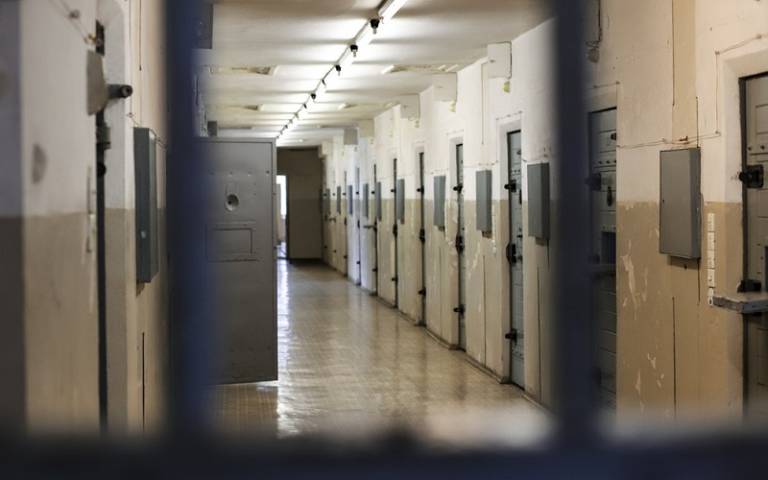Why Should Anyone Care About the Human Rights of Prisoners?
19 February 2019
Marco Segna (MSc Global Governance and Ethics) on a GGI keynote lecture with Professor Nick Hardwick.

In 2017, the Council of Europe’s Committee for the Prevention of Torture and Inhuman or Degrading Treatment or Punishment (CPT) published a report on the state of the United Kingdom’s prison system. The report stated that prisons were suffering from severe overcrowding, poor living conditions and a significant escalation in the levels of violence, making prisons unsafe for both prisoners and staff. Problems have continued to trouble the system: last year, HM Chief Inspector of Prisons Peter Clarke issued urgent notifications to the Secretary of State for Justice, regarding concerns over the treatment and conditions for prisoners within four UK prisons (Nottingham, Exeter, Birmingham and Bedford).
At a lecture at the Global Governance Institute, Professor Nick Hardwick, from Royal Holloway, University of London, also painted a stark picture of the UK’s prison system. Hardwick compared statistics between 2008 and 2018, indicating a worrying reduction in safety for both prisoners and staff: the number of prisoner deaths had doubled, the number of prisoners that self-harmed had also almost doubled, and assaults on staff had almost tripled. These increases have all occurred despite numbers of prisoners being relatively stable across the decade. What is more, Hardwick also showed that living conditions for prisoners are in a dire state. In 2017, 21% of prisoners on average reported that they were only allowed out of their cells for less than 2 hours per day. More staggering is that 37% of prisoners from young adult prisons reported to only be allowed out for less than 2 hours per day. Hardwick also shared a series of photos that graphically showed the conditions of some prisoner’s cells – the common theme: blood and squalor.
But why should anyone care?
Since John Howard reformed the prison system in the 18th century, prisons have been seen as a place of punishment and reformation rather than merely a place of transition towards trial or execution. As Jeremy Bentham stated, the new conceptualisation of the prison system was to ‘grind people honest’.
If the very point of prison is punishment, some may wonder, why should we care? Why should we worry about the conditions and safety of prisoners?
As Hardwick put it: People go to prison as punishment not for punishment. They have forfeited their right to liberty as a result of their crimes but they maintain other fundamental rights and should not be subject to any additional cruelties that aggravate the suffering inherent in imprisonment. We should all care about this, Hardwick argued, because human rights are supposed to be universal and as such, they are the minimum standards that all humans have a right to. We should not be sacrificing principles because people act or behave in a manner that we do not approve of.
As the 2015 Nelson Mandela Rules state, we should care about the human rights of prisoners because it is our obligation to respect their inherent dignity and value as human beings.
Hardwick then recalled a quote from Martin Niemöller:
First, they came for the socialists, and I did not speak out –
Because I was not a socialist.
Then they came for the trade unionists, and I did not speak out –
Because I was not a trade unionist.
Then they came for the Jews, and I did not speak out –
Because I was not a Jew.
Then they came for me – and there was no one left to speak for me.
Whether or not you believe that prisons can be a place of reform through punishment, we must agree that human rights are universal. They should not only be applied to everyone and therefore not be withheld from prisoners – but should also be actively protected by everyone.
How can we protect the human rights of prisoners?
Prisoners are particularly vulnerable to abuse. As they are locked up, they cannot escape harm inflicted upon them and their invisibility to the general public can lead to a lack of accountability for perpetrators. In order to protect the human rights of prisoners, Hardwick presented the four pillars of torture prevention.
- Laws and procedures
- Complaints and mechanisms
- Prosecution and accountability of perpetrators
- Independent preventive visits to places that deprive liberty
In practice, this means that we must improve laws to ensure that the procedures for making complaints are in place and properly managed. Next, it means holding accountable 1) those who treat prisoners in a cruel or inhuman manner and 2) those that do not provide adequate support to prisoners – prisoners rely on their jailors for basic amenities without which their standard of living can become torturous. And most importantly, to protect the rights of prisoners, we must have regular independent visits to prisons. Prisoners often have little confidence in complaint systems, especially if they are managed by the very people that they are complaining about. This, therefore, makes external monitoring essential. As Hardwick explained, currently, independent visits in the UK do not take place as often as in most other European countries, despite this, the UK uses much more personnel in visits than the other countries. Therefore, Hardwick argued, better management and use of resources is needed to ensure more regular visits.
We may, however, ask – under what conditions would the necessary restructuring of laws and procedures take place? And how can we truly ensure that the rights of prisoners are being protected, especially in light of the seemingly never-ending austerity policies?
Perhaps one key step to solving the problem within prisons is to restore the voting rights of all prisoners to ensure that politicians are held accountable. In this way, prisoners would have a voice to ensure that their rights are continually upheld. A worthy goal and an argument worth winning, yet one that will require a lot of work – David Cameron, the former Prime Minister, once said that the idea of giving prisoners the vote made him physically sick – we have a long way to go.
 Close
Close


